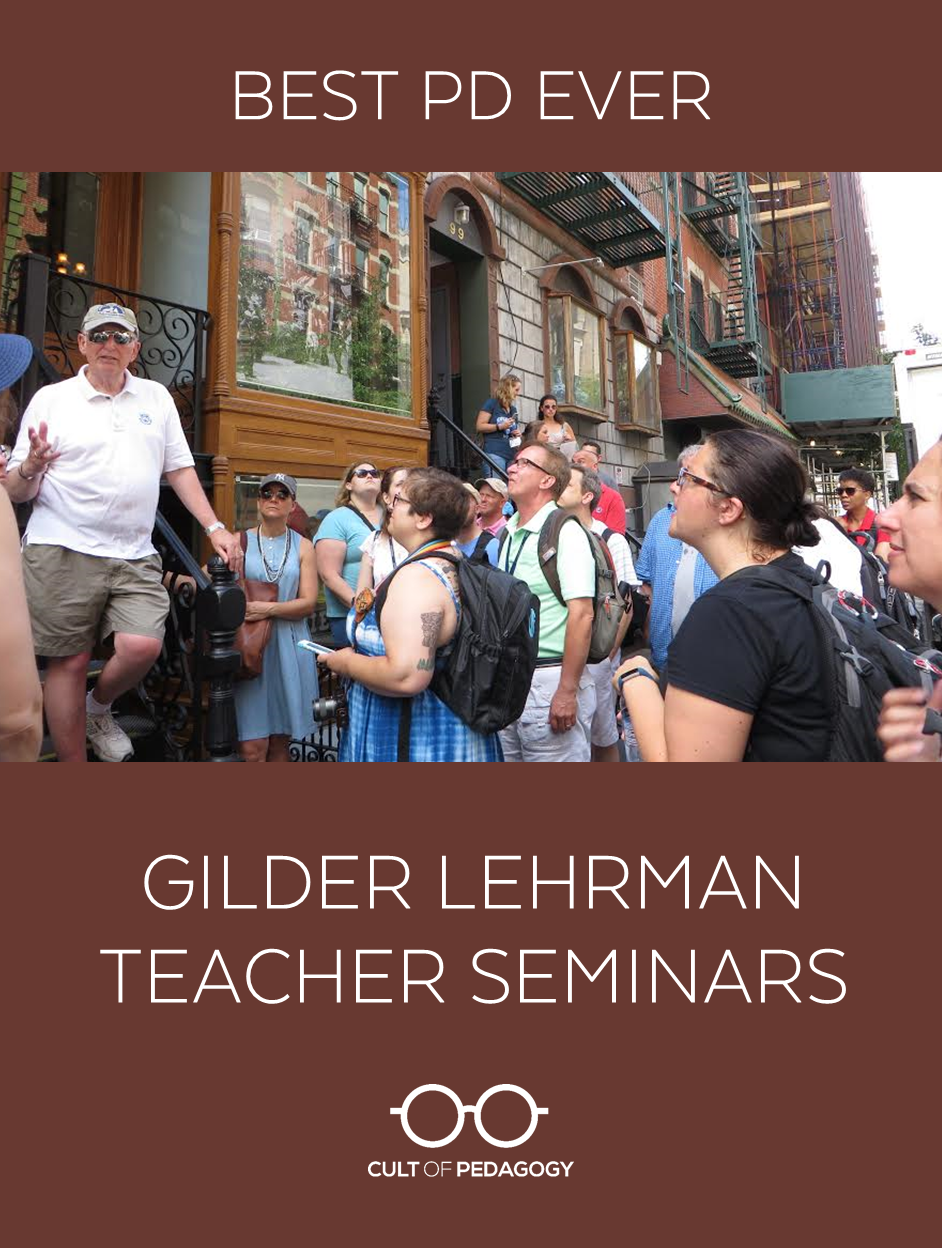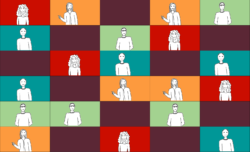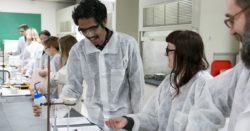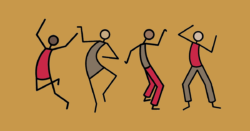
I am officially jealous of history teachers.
It’s not often that I hear a teacher go on and on about how much they got out of a PD. Professional development rarely gets rave reviews; quite the contrary. Most of the time, you ask a teacher how their PD was and they say things like this: Not relevant to my teaching. Presenter talked down to us. Total waste of time.
So last August, when my friend Maura could barely contain her enthusiasm after attending a Gilder Lehrman Teacher Seminar, it got my attention.
What, you ask, is a Gilder Lehrman Teacher Seminar? In short, it’s a history teacher’s dream come true, and a model for professional development in any subject. The one-week residential seminars, offered every summer by the Gilder Lehrman Institute of American History, bring teachers together from all over the country to immerse themselves in one specific area of U.S. history. Here are three of the 40 seminars they have planned for this summer:
The Era of George Washington. Teachers will stay on the estate of Mount Vernon, George Washington’s home, examining primary source documents, touring the estate and its collections, and learning from an Ivy League professor who has spent his career studying the American Revolution.
9-11 and American Memory. Held on the campus of New York University, participants will work with a scholar who has spent 20 years studying the way cultures commemorate wars and other traumatic events. In addition to lectures and readings, participants will explore the extensive collections of the National September 11 Memorial & Museum.
Lewis and Clark: An American Epic. In Missoula, Montana, close to where Lewis & Clark’s Corps of Discovery began its crossing of the Bitterroot Mountains, teachers will visit some of the most treacherous points of the explorers’ route, and study the journey of the Corps with a renowned scholar of American Indian history.
Each seminar is taught by a leading scholar in their field, who works with the Institute to design a course of lectures, readings, and site visits. To keep the focus on teaching, every seminar is also staffed with a Gilder Lehrman Master Teacher, who makes sure participants are able to integrate the content into their teaching. Recently, a “Teaching Literacy through History” component was added to help ELA and social studies teachers implement Common Core Standards for critical thinking and analytical skills. And participants in every seminar are trained in the use of the Institute’s substantial online collection of documents and teaching resources
Ready for the icing on the cake? The seminars are offered free of charge. That’s right, Nancy. Free. Apart from a $25 registration fee, tuition and materials are covered for full-time K-12 teachers, along with your room and three meals a day. Gilder Lehrman also reimburses up to $400 of travel expenses (more if you’re coming from outside the continental U.S.). For an additional fee, participants can earn 3 hours of graduate credit through a program offered in conjunction with Adams State University, but the seminar itself is completely free. “We aim to equip all educators — regardless of economic status — with the content and tools they need to engage and inspire students to become active, responsible, and successful citizens,” says Executive Director Lesley Herrmann. “This levels the playing field and helps close the achievement gap by giving teachers from every kind of community access to world-class professional development.”
What Makes Gilder Lehrman Seminars So Good?
Certain qualities set these seminars apart from most professional development opportunities. Although constraints of time, money, or location may keep designers of other PDs from incorporating all of these features, adding in more of them would probably make participants gush about those PDs the same way they do about Gilder Lehrman.
Direct access to content experts. Unlike most PDs, where the expert delivers content once, then leaves, Gilder Lehrman seminar directors spend the whole week with participants. Past attendee Jill Cross, a curriculum integration specialist from Jacksonville, Florida, really appreciated this access. “We had a scholar living with us for the week, available to answer our questions at any time,” she says. “Even during meals.” Spending this much time with someone who has studied one subject with incredible depth helps participants develop expertise and passions of their own. And this arrangement nurtures the connection between K-12 and university faculty, a relationship that is weak at best after teachers complete their own formal education.
On-site learning. Seminars are often held at places with a direct connection to the topic at hand, giving participants a rare opportunity to walk historic grounds, examine original artifacts, and study primary source documents in the same places where significant events occurred. Teachers who attended 2013’s Madison and the Founding Era, held at James Madison’s Montpelier home, felt the seminar wouldn’t have been the same at a different location. My friend Maura Lincoln, a civics teacher from Caldwell, New Jersey, describes it this way: “Walking, sitting in and seeing first hand the homes, furniture, paintings, and grounds of these Founders made history come to life. When I first drove up the LOOOOOONG driveway of Montpelier, it gave me pause. I immediately realized the wealth and power that was innate in these people’s lives.”
Classroom application. The presence of a master teacher ensures that participants will be able to take their learning straight into their classrooms and apply it. For Michelle George, an English teacher from Orofino, Idaho, strengthening her knowledge of historical documents improved her ability to teach informational text. “With the advent of the CCSS, real content in various disciplines is essential,” she explains. “I’ve gained access to some excellent primary documents that I can use to teach deep reading strategies that are integral to critical thinking and learning.”
Connection to other teachers. Living and working together for a week, with the responsibilities of regular life set aside, participants form relationships that last long after seminars have ended. Courtney Meisberger, a social studies teacher from Berkshire County, Massachusetts, says the most valuable thing she took away from her seminar was a new group of teacher friends; they still keep in touch. “I ask them questions and get new ideas from them on a regular basis,” she says. And because teachers come from different states and schools, they learn things that go beyond the study of history. “To be with teachers from around the country was one of the most important features,” says Lincoln. “We learned about each other’s states, teaching styles and beliefs.” This kind of learning is hard to replicate in a 3-hour local PD or an online workshop. There’s something about settling in, getting to know each other and building trust that helps teachers really reap the benefits of spending time with professionals from different backgrounds.
Want to go?
Seminars are open to full-time K-12 teachers of any subject; you do not have to teach history, just have a passion for it. Another requirement is that your school needs to be part of Gilder Lehrman’s network of affiliate schools. If you’re not already an affiliate school, don’t worry. Applying to become an affiliate is a fast, straightforward process, it costs nothing, and it can be done right along with your seminar application. Once your school is an affiliate, you and your colleagues will have an ongoing relationship with the Institute, enjoying access to their resources and making it easier for other teachers to apply to seminars in the future. ♦
Join my mailing list and never miss another post. You’ll get weekly tips, tools, and inspiration — in quick, bite-sized packages — all geared toward making your teaching more effective and joyful. To thank you, I’ll send you a free copy of my new e-booklet, 20 Ways to Cut Your Grading Time in Half. I look forward to getting to know you better!





I came across your article about the Gilder Lehrman teacher seminars from about two years ago and can not wait to apply for next year since I missed the deadline. A few years back I had an incredible week of learning at the Colonial Williamsburg Teacher Institute. It completely pushed me to revamp how I teach and provided a plethora of background historical knowledge on the colonial era. Much like your description of the G.L. teacher seminars, I was able to learn from the experts with the real deal- the location, the physical objects, master teachers. AND – the icing on the cake- we stayed in the colonial houses in Williamsburg, ate at all the best restaurants, and I was able to work and learn with and from about 25 years from all over the country. And there were scholarships available for different states- I was able to go free of charge- everything paid for – plane, food, lodging. I am attending the George Washington Teacher Institute at Mount Vernon this summer and am hoping for another awesome learning experience. You are so right- they do get pedagogy right for history teachers.
Erin, thanks so much for sharing this! I have seen some of the programs and materials for the Colonial Williamsburg Teacher Institute, and they look phenomenal.
Attended John Demos’s Colonial Period session at Yale five years ago, and you’re right–I’ve never had a better professional development experience.
How much do the programs actually use the assigned reading that you do before you go? I feel like I am doing a lot of reading and I hope its actually used.